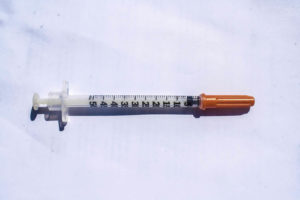Original By: AMY ESKIND
Posted On: September 25, 2017
The combining of powerful drugs — both purposeful and unintentional — is making Tennessee’s opioid epidemic even more deadly. The latest figures out this month show 2016 was another record year for overdoses in the state — more than 1,600 people died. And experts say risky drug cocktails are compounding the problem.
Emergency responders have answered hundreds of 9-1-1 calls from friends and family members of people who have overdosed. Last year Davidson County lost 261 people to overdose, almost all of them from opiates. On the street, heroin is a cheaper opiate than pills. Many users are looking for whatever will give them the highest high, says recovering addict Mary Barton Lea.
“When I was buying my heroin I said, ‘who’s got the heroin with the fentanyl?’” she says. “That’s the heroin I want.”
Fentanyl is a very strong opiate that magnifies the experience and lasts longer. Experts expect to see more of it coming into Middle Tennessee.
“It’s a sleep-like state, it’s a state that you feel secure,” Lea says. “I’ve read — and I tend to agree with this — it’s almost like kissing God, because it takes you to a place you’ve never been before.”
But that incredible high comes with a physical and mental addiction, Lea says.
“When you come down from that state, all your body says is I want to get back there…You get up there quick, but then there’s a crash and the crash is horrible. The crash is you will do anything within your power to get more.”
Serious addicts like Lea may be willing to flirt with death. Others are simply unaware, says Sam MacMaster. He’s the chief clinical officer at JourneyPure, an addiction treatment provider. He warns that no one can be sure what they’re buying in the illegal market.

Sadly, 2016 was another record year for overdoses in the state — more than 1,600 people died. And experts say risky drug cocktails are compounding the problem.
“You would not be able to tell [by] how it looks at all, and that’s the issue,” MacMaster says. “They believe that they’re purchasing typically heroin or sometimes even a pilled opiate but it’s been cut with fentanyl.”
Indeed, the U.S. Drug Enforcement Agency . As with heroin, unscrupulous dealers add fentanyl to give themselves a marketing edge — they’ve got the strong stuff.
But some users are buying the laced drugs unknowingly. They may erroneously think it’s stronger because it’s more pure. The next thing they know, they can’t breathe. Then their heart stops.
“If I believe I’m shooting x-amount of heroin, I may in fact be shooting something that is much more potent. And while I may have a sense of what my body can handle, I’ll have no idea what my body can handle in terms of the fentanyl,” MacMaster says.
Some dealers are even lacing their supplies with carfentanil, a veterinary opiate that can knock out a rhino.
But lethal combinations go beyond various opioids. Users have also been adding prescription anxiety medications, such as Xanax, Valium or Klonopin. Not only is that a doubling up on medications that depress the central nervous system, experts worn there can be a multiplier effect. And it’s hitting teens and young adults hard, especially since many of them already have anti-anxiety prescriptions. Others have painkillers, maybe prescribed for an injury.
“There’s actually prescription parties where kids will have a party and everybody raids the medicine cabinets they can get to, brings them to the party, and then you have whatever you have at that party for people to experiment with,” says Cinde Stewart Freeman, chief clinical officer at Cumberland Heights, an addiction treatment center.
Cole Szabo, adolescent specialist at Cumberland Heights, says the days when kids stuck to beer and marijuana are gone.
“The benzos and opioids are the new gateway drug,” he says. And it’s in the schools. “You’re seeing Xanax, you’re seeing benzos, you’re seeing hydrocodones, oxycodones, Vicodin – you’re seeing that more. The problem with that is, you’re going to die quickly. It’s a quick death, you’re going down fast.”
If administered in time a nasal spray called Narcan that reverses the effects of opiates can save a life. Emergency responders in Nashville have used it on more than 500 people already this year.
But Narcan has no effect on other drugs like anti-anxiety pills, cocaine, or alcohol, so combination overdoses can still prove lethal. That was unfortunately the case for Max Barry, the son of Nashville’s mayor, who could not be revived with Narcan, and died over the summer in Colorado with much more than opiates in his system.











